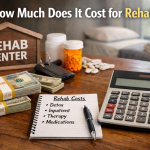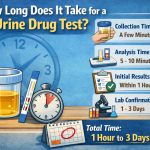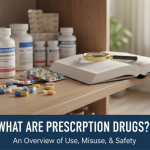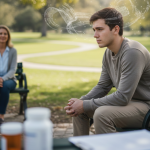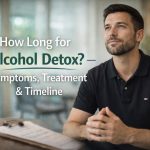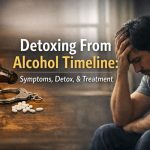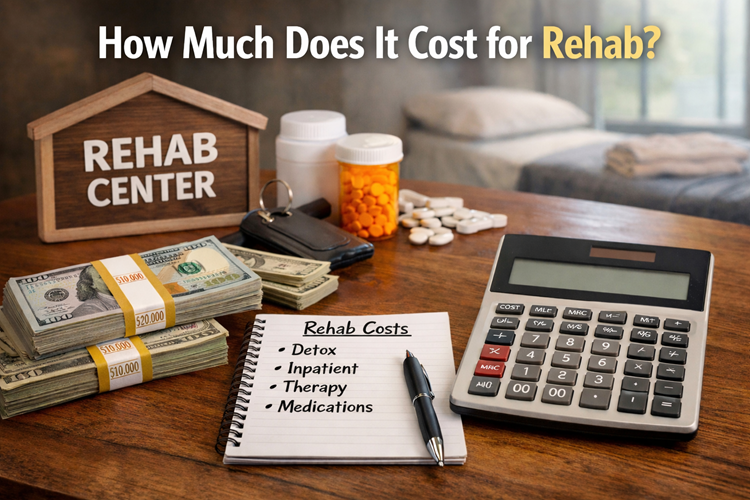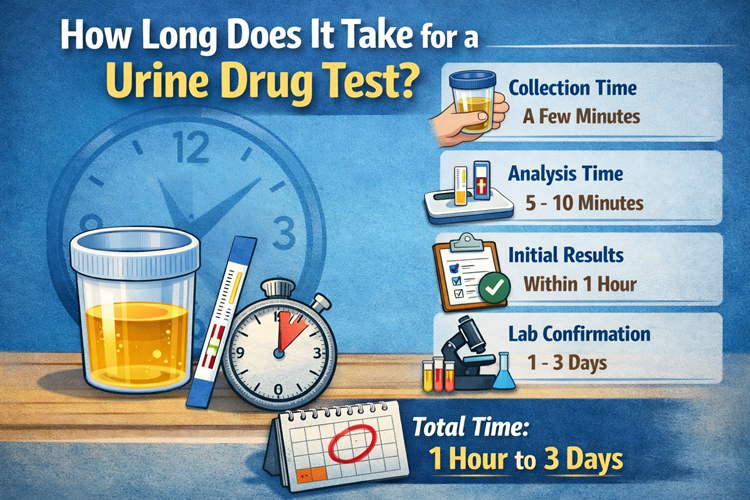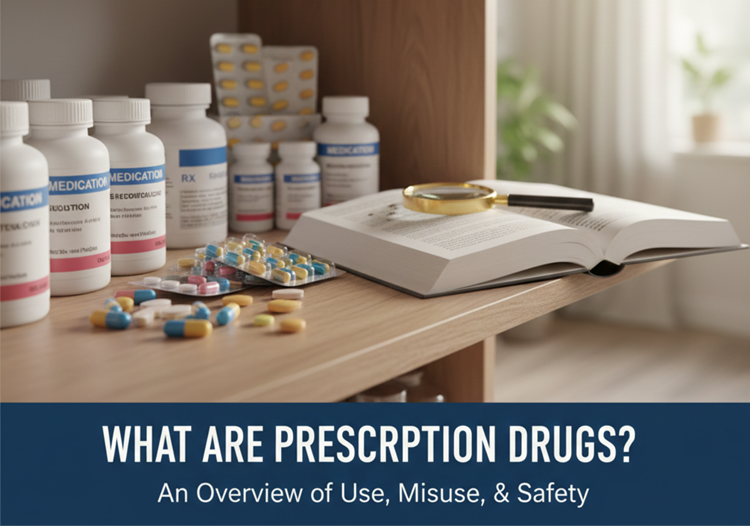Taking opioids can pose a risk of developing addiction, but it’s essential to stay informed and hopeful. Personal history and how long someone has used a substance are important factors. However, it is hard to predict who might become dependent or abuse it.
Below, you will learn what opioids are as well as what signs to look for in a person who may be addicted. Learn what treatment options are available for you or your loved one struggling with opioid addiction.
What are Opioids?
Opioids are substances that can occur naturally or be made in a lab. They attach to certain receptors in the brain or body. This process reduces the strength of pain signals sent to the brain. Physicians occasionally prescribe these medications to alleviate moderate to severe pain.
Prescription opioids are used to manage pain, whether it is short-term or long-term. They are often prescribed after surgery, injury, or for ongoing medical problems like cancer and fibromyalgia.
How do Opioids Work?
As opioid molecules circulate in the bloodstream and reach the brain, they bind to receptors on specific cell surfaces. The brain’s reward system triggers a chemical reaction akin to feelings of intense pleasure. This response encourages vital human behaviors. Motivated by instinctual rewards and survival needs, these actions release dopamine.
Using opioids, like other addictive drugs, leads to a huge release of dopamine. This release is much higher than what is needed for pleasure or survival.
What are the Signs of Addiction?
Opioid use disorder involves both physical and psychological processes. It can progress slowly and may not be recognized until a crisis occurs. Each person’s situation is different. Be aware of the following warning signs so you know when to take action:
- Taking Opioids in increased amounts for longer than intended.
- Strong cravings or a desire to use opioids.
- A desire (without success) to control opioid use.
- Failing to meet obligations at work due to opioid use.
- Avoiding social events due to opioid use.
- Continued opioid use despite hazardous physical risk.
- Built tolerance to opioids, leading to increasing doses to achieve the desired effect.
- Lack of personal hygiene.
- Decreasing exercise habits.
Side Effects and Dangers
Just like most medications, opioids come with their fair share of side effects, even when taken as prescribed.
Some common side effects are:
- Drowsiness
- Constipation
- Nausea/vomiting
- Dry mouth
- Confusion/hallucinations
- Itching or sweating
- Decreased libido
- Increased sensitivity to pain
Opioids are risky for everyone. If you take prescription opioids, you are at risk of overdose.
Some factors put you at higher risk for overdosing, such as:
- Having a previous Substance Use Disorder (SUD).
- Taking benzodiazepines with opioids.
- Having sleep apnea or another form of sleep-disordered breathing.
- Having kidney or liver failure.
- Being 65 years or older.
- Taking higher doses of opioids.
Taking a large dose of any opioid can cause an overdose. This can lead to shallow or constricted breathing in the person who took the opioid. It may even cause them to stop breathing completely. Knowing the signs of an overdose can save lives.
They include:
- Pinpoint pupils
- Shallow breathing
- Convulsions
- Cold, clammy skin
- Purple lips
- Changes in the nervous system
- Coma
Treatment Options
Opioid use disorder is a complex condition. Effective treatment works best when it is personalized. There is no one-size-fits-all approach. Each person needs a unique therapeutic approach to help achieve long-term recovery. Treatment for opioid addiction is offered through multiple models to help serve a variety of populations.
Opioid Detox
The first step in treating opioid addiction is detox. Detox has three phases: evaluation, stabilization, and starting ongoing treatment.
Medical detox is often an uncomfortable process to go through, but it can be managed with certain medications and therapies to help keep you comfortable. While the patient is experiencing withdrawal symptoms, a medical provider can prescribe methadone, buprenorphine, or Suboxone to ease the process.
Inpatient
If you are struggling with severe opioid addiction or dependency, inpatient treatment is probably right for you. Inpatient treatment involves staying at a residential facility where they can receive care 24/7.
Staying at a residential treatment center in Florida allows you to do a medical detox safely and with the assistance of medication and therapy. It also allows you to focus solely on what habits you need to change and receive care for any mental health conditions you might be dealing with. Inpatient care will help you find ways to manage pain without using opioids.
If you are planning to enter inpatient treatment, prepare for your stay by doing the following ahead of time:
- Talking to your employer
- Finding care or a place to stay for children or other family members
- Make a plan for how you will get to and from the rehab center
- Ask what personal items you are allowed to bring with
- Find out what kind of contact you can have with friends and loved ones while you are staying at the facility
Outpatient
Outpatient treatment may be right for you if your opioid dependency is less severe. This level of care is typically less intensive than inpatient treatment and often serves as the next level of support for patients after completing inpatient treatment programs. Outpatient treatment offers more flexibility, which is ideal for some patients. Typically, outpatient treatment is provided in two ways: partial hospitalization and intensive outpatient.
Partial hospitalization programming (PHP) is the most intense outpatient treatment. It aims to stabilize behaviors during early recovery. Many residential programs offer a PHP, which patients typically transition to if they live nearby.
Partial Hospitalization Programs (PHP) typically require a significant time commitment, with participants engaging in 5-6 hours of treatment per day, 5-6 days a week. This level of care is similar to a full-time job and is best suited for individuals who are not working. PHP offers intensive treatment without requiring full hospitalization, making it a suitable option for those transitioning from inpatient care or needing structured support while living at home.
Intensive outpatient programming (IOP) is the lowest level of outpatient care. In IOP, patients slowly return to their daily lives. They attend treatment for 3 hours a day, 3 to 5 days a week. This offers more flexibility for work and personal needs and provides support as they readjust to the world.
In IOP, the patient’s focus is on relapse prevention, psychoeducation, individual and group counseling, and teaching recovery skills to help reduce relapse and promote long-term recovery. Outpatient treatment is an excellent option if you or someone you love has a mild opioid dependency or if you are simply looking for a long-term care option for your addiction.
Ongoing Support
Most patients benefit from ongoing support following the completion of opioid addiction treatment. Support programs today are evolving rapidly with the use of technology. Some popular options are online therapy sessions via telehealth, staying in a sober living community, or attending 12-step meetings.
Get Treatment for Opioid Addiction in Florida Today
With all of the different levels of treatment options available, it is possible for anyone suffering from opioid dependency to find a program that suits their needs. If you or someone you love is in search of opioid addiction treatment in Florida, consider contacting us to start the evaluation process and find what level of care is right for you.
Reference
- Centers for Disease Control: Treatment for Opioid Use Disorder
- Johns Hopkins Medicine: Opioid Use Disorder
- American Psychiatric Association (APA): Opioid Use Disorder



















